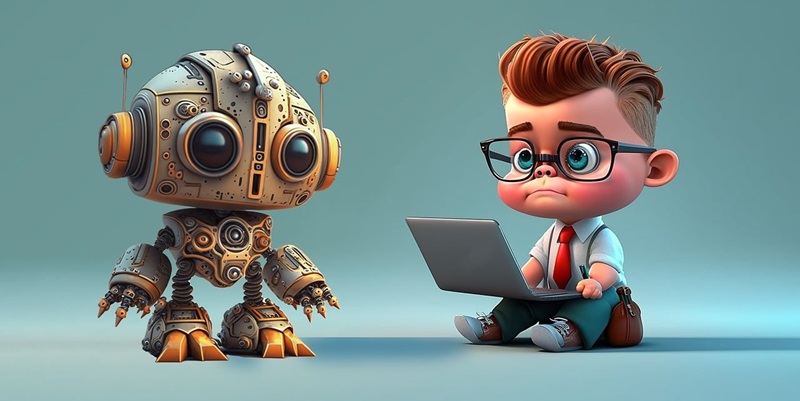The rapid advancement of Artificial Intelligence (AI) has revolutionized numerous aspects of our lives, presenting new opportunities for innovation while also raising important ethical considerations. As AI technology progresses, it is critical to maintain a human-centric approach that prioritizes the enhancement of human capabilities, productivity, and economic opportunities. Authored by Shaz Khan, CEO and Co-Founder of Vroozi, this thoughtful analysis explores the relationship between AI and humanity, addressing both the promise that AI technologies hold for catalyzing breakthroughs across industries and the profound ethical dilemmas they introduce.
Embracing AI as a Human Ally
Artificial Intelligence, as envisioned by tech evangelists like Shaz Khan, isn’t here to usurp our positions, but to partner with us, unlocking levels of efficiency and innovation that transcend human limitations. In healthcare, AI’s ability to analyze vast datasets has proved indispensable for diagnosing diseases swiftly and advancing the rapid development of pharmaceuticals. The realm of education, too, has seen a transformation, with AI tailoring learning experiences to suit individual student needs and presenting new dimensions of supportive resources.
Yet, the partnership between AI and humanity goes beyond specialized sectors—it is poised to revolutionize the very nature of work and creativity. By managing tasks that are too cumbersome, repetitive, or complex for humans, AI liberates our potential, propelling us toward endeavors that significantly benefit from human ingenuity, empathy, and strategic thinking. It’s a fusion aimed at magnifying our finest qualities, ensuring that technology remains our amplifying companion.
Addressing the Job Market Evolution
Grappling with the public’s anxiety over AI-induced job displacement, Khan turns to the archives of history, which illustrate a consistent trend: with each technological leap, new employment landscapes are born. Today’s AI-infused horizon is expected to burgeon with job opportunities, particularly in domains that revolve around managing and advancing AI systems. The workforce is not facing obsolescence but transformation, necessitating a pivot towards skills that underline human creativity and strategic acumen.
As we navigate this transition, ‘upskill and retrain’ becomes the clarion call for the modern employee. Businesses are challenged to invest in training that prepares their workforce for this new era, where collaboration with AI is as elemental as any traditional work skill. The potential for enriched job satisfaction looms large as roles evolve to emphasize the uniquely human attributes machines have yet to replicate.
Navigating Intellectual Property in the AI Era
The burgeoning capabilities of AI in the realm of creativity and innovation naturally elicit intellectual property concerns. Khan highlights the complexity of authorship and ownership in a landscape where AI’s role in the creative process is increasingly significant. The traditional frameworks that protect the rights of creators are now confronted with the task of integrating the contributions of AI, necessitating a sophisticated evolution of intellectual property laws that ensure fairness and proper acknowledgment for all involved.
The challenge is clear: how do we navigate a future where AI-generated content becomes commonplace without diminishing the value and rights of human contributors? This predicament beckons for a well-thought-out approach that strikes a balance between encouraging innovation and protecting the legal and moral interests of the creators who leverage AI as a tool for advancement.
Championing a Human-Centric AI Development
Khan advocates for an AI development ethos rooted in human-centric values—transparency, accountability, fairness, and inclusivity. These principles are fundamental to the construction of AI systems that not only prevent biases but also prioritize accessibility for all individuals, including those with disabilities and others who might otherwise be marginalized by technology. The prescription for minimizing AI biases involves diversified datasets and the intentional incorporation of diverse perspectives within development teams, ensuring that biases do not perpetuate inequality but instead forge a more inclusive future.
It’s a call for intentionality in the way we sculpt our AI counterparts; a reminder that the technology driving us forward is only as equitable and just as the minds and morals steering its course. By championing inclusive design and ethical frameworks, we aim to construct a technological landscape that reflects the depth and diversity of the human experience and holds steadfast in its service to every facet of our society.
Towards an Ethical AI Implementation
The swift progression of Artificial Intelligence (AI) has not only heralded a new era of innovation, transforming many facets of our existence but has also brought with it significant ethical questions. As AI continues to evolve at a breakneck pace, keeping human needs and values at the core is imperative. This ensures that as we harness AI’s power, we do so to augment human abilities, increase workplace efficiency, and open up new economic vistas. Vroozi’s CEO and Co-Founder, Shaz Khan, delves into the intricate dance between AI advances and their human counterparts. His analysis meticulously underscores the potential of AI to drive unprecedented industry advancements while contemplating the weighty moral quandaries it poses. This holistic view stresses the necessity of steering AI development consciously, aligning it with the betterment of human society and respecting the complex ethical territory it encompasses.

